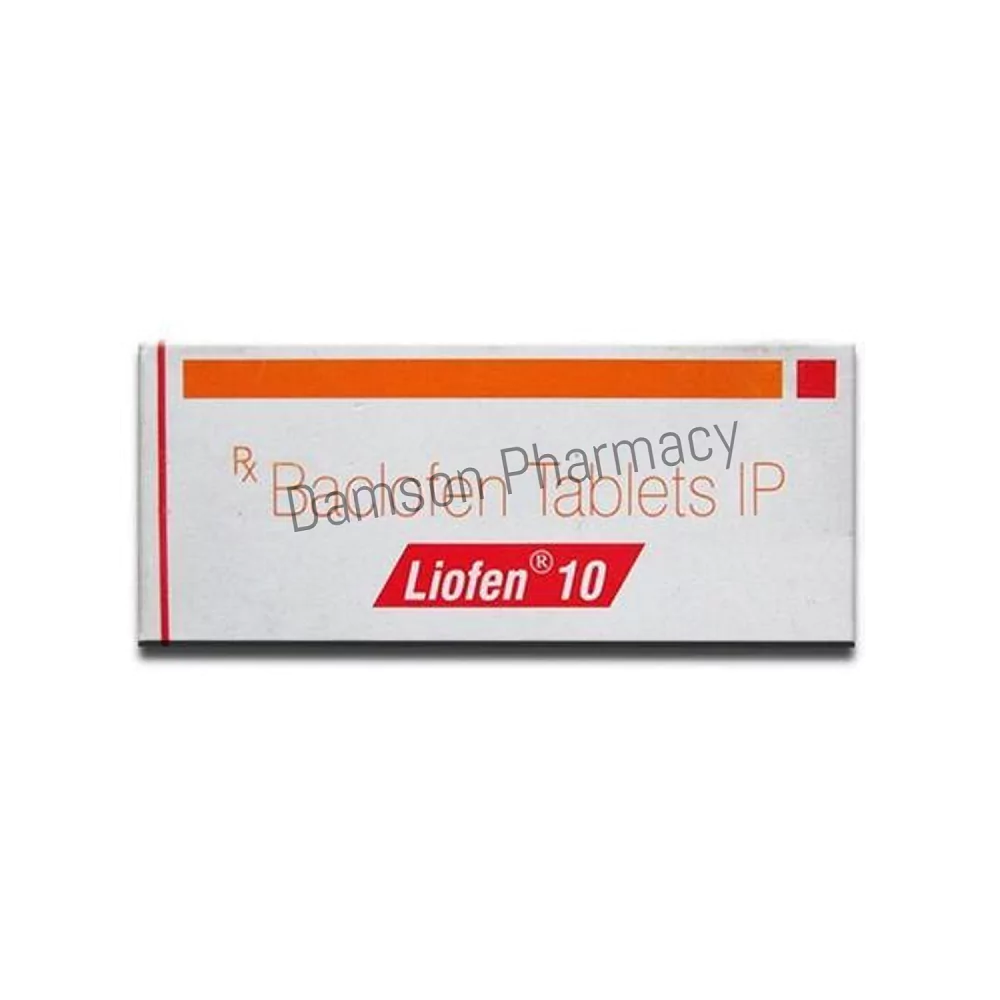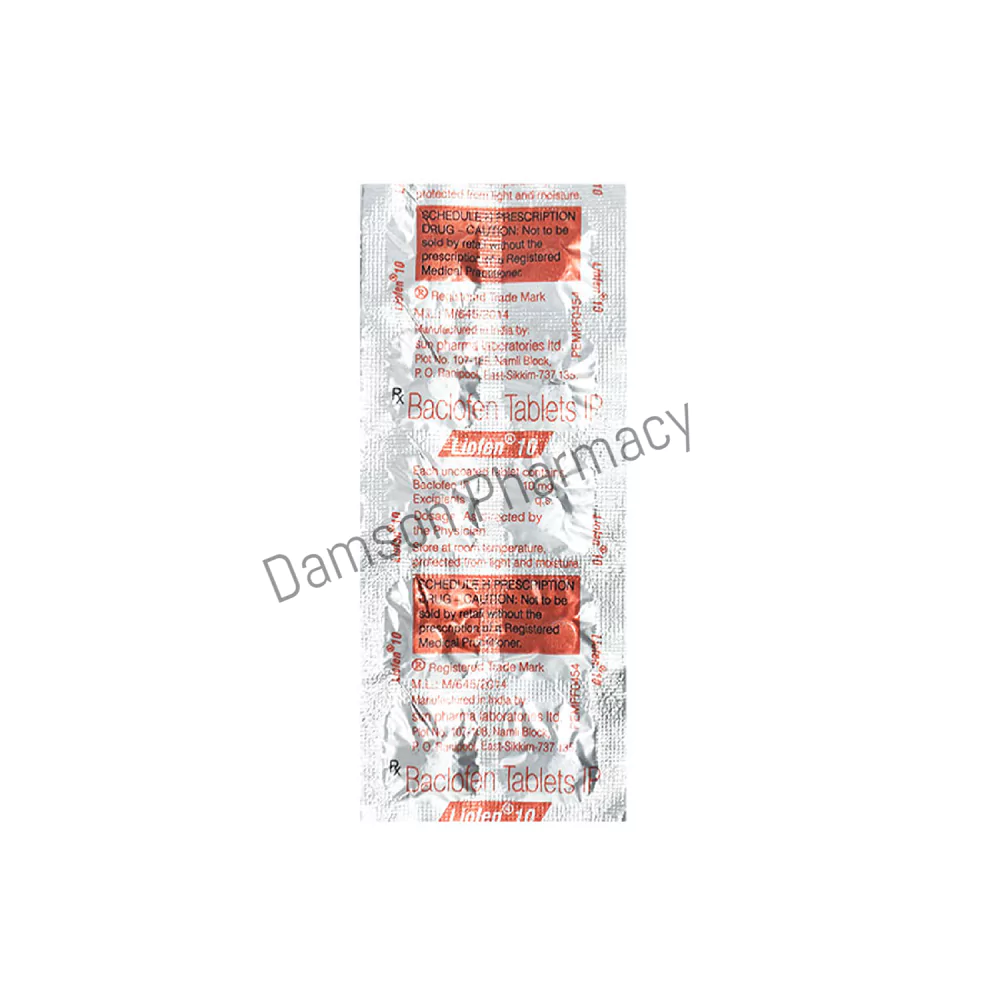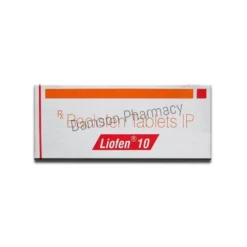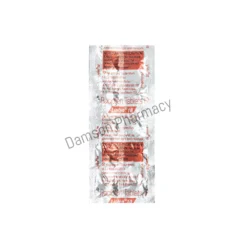Liofen 10mg Baclofen Tablets
$80.00 – $210.00Price range: $80.00 through $210.00
| Pack Size | Price | Price / Unit | Quantity | |
|---|---|---|---|---|
| 100 Tablets | $80.00 | $0.80/ unit | ||
| 200 Tablets | $150.00 | $0.75/ unit | ||
| 300 Tablets | $210.00 | $0.70/ unit |
Looking for bulk / B2B pricing? | Send Inquiry |

| SKU | 11501 |
| Manufacturer | Sun Pharmaceutical Industries Ltd |
| Categories | Muscle Relaxants |
| Delivery Time | 10 - 14 Working Days |
| Strength | 10mg |
Introduction to Liofen 10mg Tablets
Liofen 25 Tablet is a muscle relaxer. It is used to treat muscular symptoms such as rigidity, tension, and stiffness that may occur due to various conditions such as cerebral palsy, multiple sclerosis, motor neuron disease, or injury to the head, brain, or spine.
Liofen 25mg Tablet is a medication that contains Baclofen as its active ingredient. Baclofen is a muscle relaxant that is commonly used to treat conditions characterized by muscle stiffness and spasms, such as spasticity associated with conditions like multiple sclerosis, spinal cord injuries, and certain neurological disorders.
Liofen may interact with certain medications, and it is important to inform the healthcare provider about all the medications, supplements, and herbal products being used.
Uses of Liofen 10mg
Liofen 25mg Tablet, containing Baclofen as its active ingredient, is primarily prescribed for the treatment of conditions associated with muscle spasticity. Muscle spasticity involves the continuous contraction of muscles, leading to stiffness and difficulty in movement. Here are the main uses of Liofen 25mg Tablet:
- Spasticity Associated with Multiple Sclerosis (MS)
- Spinal Cord Injuries
- Neurological Disorders
How Does Liofen 10 mg Tablets Works?
Liofen 10mg contains baclofen, a muscle relaxant that works by acting on the central nervous system (CNS) to reduce muscle spasms and stiffness. It enhances the activity of gamma-aminobutyric acid (GABA), a neurotransmitter that inhibits excessive nerve signals in the spinal cord, leading to muscle relaxation.
Liofen 10mg should be taken exactly as prescribed, usually with food to prevent stomach irritation. Abruptly stopping the medication can lead to withdrawal symptoms, so it is important to follow the doctor’s instructions for gradually reducing the dose if needed.
Side Effects of Liofen 10
Common Side Effects
- Drowsiness
- Dizziness
- Weakness or Fatigue
- Nausea
- Headache
- Blurred Vision
- Dry Mouth
- Constipation
Serious Side Effects
- Allergic Reaction
- Severe Drowsiness or Confusion
- Muscle Weakness or Trouble Breathing
- Hallucinations or Psychiatric Symptoms
- Seizures
- Signs of Liver Problems
Dosage of Liofen 10mg
The dosage of Liofen 10mg (Baclofen) varies depending on the patient’s condition, severity of muscle spasticity, and medical history. It is usually started at a low dose and gradually increased to minimize side effects. The typical starting dose is 5–10mg taken three times a day, with adjustments made by the doctor as needed.
Liofen should be taken with food to reduce stomach discomfort, and the dose should never be stopped abruptly to avoid withdrawal symptoms. Always follow the doctor’s instructions for safe and effective use.
Other Dosage of Liofen
How To Manage Side Effects?
- Communicate with Your Healthcare Provider
- Dosage Adjustment
- Take Medication with Food
- Monitor Blood Pressure
- Avoid Alcohol
- Prevent Dehydration
- Drowsiness and Driving
- Regular Follow-Up Appointments
- Maintain a Healthy Lifestyle
Warning & Precautions
Before taking Liofen 25mg Tablet (containing Baclofen), it’s important to be aware of the warnings and precautions associated with the medication. Always follow the guidance of your healthcare provider and inform them of your medical history, including any pre-existing conditions or medications you are taking. Here are some important warnings and precautions:
1. Central Nervous System Depression:
- Baclofen may cause drowsiness and dizziness. Avoid activities that require mental alertness, such as driving or operating machinery, until you know how the medication affects you.
- Alcohol and other central nervous system depressants can enhance the sedative effects of Baclofen. Limit alcohol intake and discuss the use of other medications with your healthcare provider.
2. Abrupt Discontinuation:
- Do not stop taking Liofen abruptly without consulting your healthcare provider. Abrupt discontinuation may lead to withdrawal symptoms, including hallucinations, seizures, and increased spasticity. Dosage should be tapered down gradually under medical supervision when discontinuing the medication.
3. Renal Impairment:
- Use caution in patients with impaired renal function, as Baclofen is excreted by the kidneys. Adjustments to the dosage may be necessary in individuals with renal impairment.
4. Hepatic Impairment:
- Use Liofen with caution in individuals with impaired liver function. Monitoring for signs of liver dysfunction, such as jaundice, is important.
5. Elderly Patients:
- Elderly individuals may be more sensitive to the sedative effects of Baclofen. Dosage adjustments may be needed.
6. Pregnancy and Breastfeeding:
- Discuss the risks and benefits of using Liofen during pregnancy and breastfeeding with your healthcare provider. The safety of Baclofen in these situations is not well established.
7. Spinal Cord Tumors:
- Caution is advised in individuals with a history of spinal cord tumors, as Baclofen may increase the risk of seizures.
8. Urinary Tract Infections:
- Liofen may increase the risk of urinary tract infections. Monitor for symptoms such as pain or burning during urination, frequent urination, or blood in the urine.
Safety Advice
- Timing
- Food Interaction
- Avoid Alcohol
- Driving and Operating Machinery
- Medical History
- Pregnancy and Breastfeeding
- Other Medications
Frequently Asked Questions
1. Can Liofen 10mg Tablet be taken during pregnancy or breastfeeding?
Consult your doctor if you are pregnant, planning to become pregnant, or breastfeeding. The safety of Liofen during pregnancy and breastfeeding is not well-established.
2. What should I do if I experience severe side effects?
If you experience any severe or unusual side effects, contact your healthcare provider immediately. Seek medical attention if necessary.
3. Can I drive or operate machinery while taking Liofen 10mg Tablet?
Liofen may cause drowsiness or dizziness. Avoid driving or operating heavy machinery until you know how the medication affects you.
4. Can I stop taking Liofen 10mg Tablet suddenly?
Do not stop taking Liofen suddenly without consulting your doctor. Abrupt discontinuation can lead to withdrawal symptoms. Your doctor may need to taper the dosage gradually.
| Pack Size | 100 Tablets, 200 Tablets, 300 Tablets |
|---|---|
| Price/Unit | $0.70 /unit, $0.75/unit, $0.80/unit |
Be the first to review “Liofen 10mg Baclofen Tablets” Cancel reply
Related Products
No related Products Found









Reviews
There are no reviews yet.